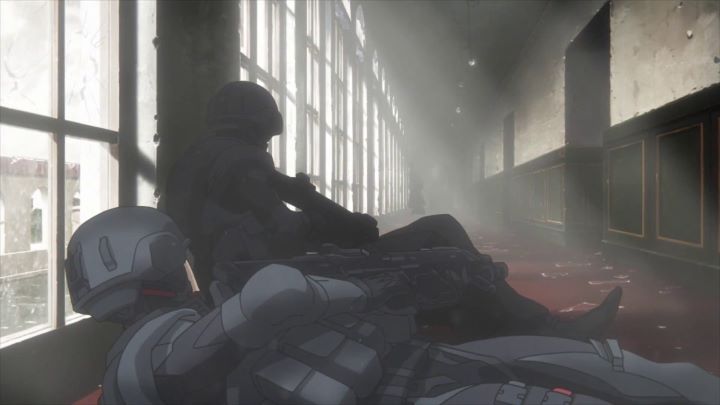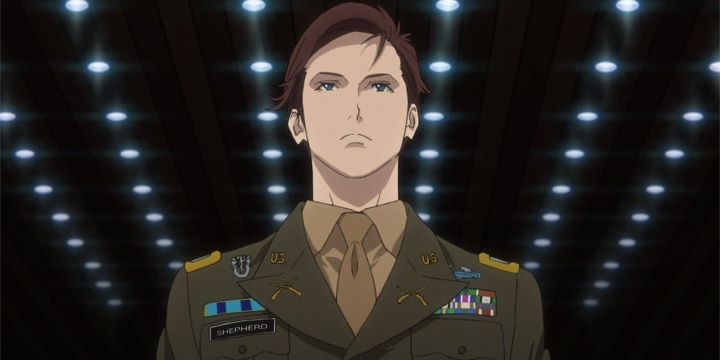








"Genocidal Organ" is the third and final part of the amibitous "Project Itoh" trilogy, a series of film adaptations of three stories by the Japanese science fiction writer Project Itoh, who tragically passed away in his thirties. In particular, "Genocidal Organ" had a troubled production history: the three films were scheduled to be released within months of each other in 2015, with "Genocial Organ" to be the second of the two. However, the film was in production by Studio Manglobe, who declared bankrupcy in September 2015, only two months before the planned release date. It was a difficult loss, as Studio Manglobe was well-respected by Western audiences for their quality, character designs, story themes and direction, all of which seemed to cater better to international audiences than most other anime.However, many of the original staff from Manglobe declared the formation of a new studio by the end of 2015, appropriately called "Geno Studio," formed in purpose to complete the half-finished Itoh film. And so, by the end of 2016, the trilogy was finished. One might be concerned that the production might have suffered, but thankfully the quality remains solid, if only slightly weakened compared to the previous two films from Studio 4C and Wit. And more importantly, the strong writing of the original work shines through, and "Genocidal Organ" stands as another strong example of science fiction. Unlike the previous two films however, Funimation did not provide as wide a theatrical release for "Genocidal Organ," and it is easy to see why. It is first and foremost a political thriller, and smart spy films can come across as a little dull to most viewers when lacking exciting action scenes. The story follows an American secret agent named Clavis Shepherd during a near-alternate future where the USA has accepted scientific breakthroughs in favor of constant surveillance and lack of privacy after a series of terrorist attacks, including 9/11 in 2001. Overseas, third-world countries have inexplicably experienced acts of genocide and civil war, tearing themselves from the inside. The American govenrment has found one common thread: John Paul, an American linguist and researcher who mysteriously visited each country months before violence breaks out. Commander Shepherd is tasked with hunting down and killing John Paul, and in the process, he slowly uncovers the mystery of what and how he started chaos around the world.It's interesting that the story purposely features the USA. It is critical of its decadence and ignorance of countries elsewhere in the world, and the final climax moments of the film revel in this disgust in American values. It's not hard to agree with its message, but I think it sounded a bit preachy at times. Never mind that most of the film consists of calm conversations, sometimes referencing the works of Kafka to fill the time. It's smart, but also feels like showing off, and while it has a purpose in the world-building and characterization (and succeeds upon hindsight review), it also comes across as a little dull. Like the previous two films, it delivers in the payoff, resulting in a cliffhanger-twist ending that will ensure I remember it for a long time, even if I don't think I will rewatch it often. Much is done to develop the world of the movie, and its a well-realized world unlike anything in other media. Shepherd is one of many American super-soldiers, not because of super-strength or speed, but because they are trained to block out their emotions in favor of logic and obidience, and are outfitted with technology to help them communicate or camouflage. The technology is almost entirely inspired by organic materials, many resembling outer muscle tissue or organs or animals, often disintegrating upon disposal. The visuals are otherwise kind of bland, mostly in shades of black, and the character designs are a bit uncanny - I realize this was because the face proportions are much more realistic than other anime. Similarly, the animation is quite grounded in reality. It's a shame the color palette didn't try for something more fantastical like "Harmony," if it had, the detail used would have really popped to a new level. It still looks better than most anime, but it's difficult to justify why this wasn't a live-action production. Aside from the casual discussions between characters, there are a handful of action scenes, mostly making their point through extreme violence when the heads of brainwashed-children get their heads shot off, often at a close-up from the camera: this is a mature film for adults only. The music is also just servicable, the only memorable part being the catchy pop ending theme, although the sound effects make more of an impact here than the other two movies of the series.Of the three, I would aruge "Genocidal Organ" has the smartest story, but it is also the most dull from an entertainment point of view. It's still something of a miracle that all three movies are as good as they are. They aren't for everyone, but if you want a bleak peak into the future, they cannot be missed.
Much is done to develop the world of the movie, and its a well-realized world unlike anything in other media. Shepherd is one of many American super-soldiers, not because of super-strength or speed, but because they are trained to block out their emotions in favor of logic and obidience, and are outfitted with technology to help them communicate or camouflage. The technology is almost entirely inspired by organic materials, many resembling outer muscle tissue or organs or animals, often disintegrating upon disposal. The visuals are otherwise kind of bland, mostly in shades of black, and the character designs are a bit uncanny - I realize this was because the face proportions are much more realistic than other anime. Similarly, the animation is quite grounded in reality. It's a shame the color palette didn't try for something more fantastical like "Harmony," if it had, the detail used would have really popped to a new level. It still looks better than most anime, but it's difficult to justify why this wasn't a live-action production. Aside from the casual discussions between characters, there are a handful of action scenes, mostly making their point through extreme violence when the heads of brainwashed-children get their heads shot off, often at a close-up from the camera: this is a mature film for adults only. The music is also just servicable, the only memorable part being the catchy pop ending theme, although the sound effects make more of an impact here than the other two movies of the series.Of the three, I would aruge "Genocidal Organ" has the smartest story, but it is also the most dull from an entertainment point of view. It's still something of a miracle that all three movies are as good as they are. They aren't for everyone, but if you want a bleak peak into the future, they cannot be missed.